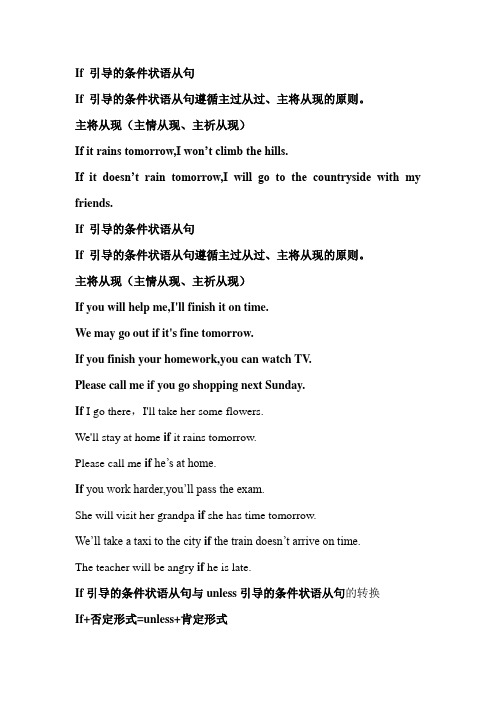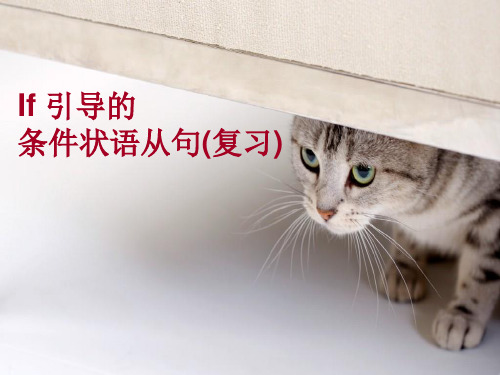if主将从现的用法例句
If-引导的条件状语从句

If 引导的条件状语从句If 引导的条件状语从句遵循主过从过、主将从现的原则。
主将从现(主情从现、主祈从现)If it rains tomorrow,I won’t climb the hills.If it doesn’t rain tomorrow,I will go to the countryside with my friends.If 引导的条件状语从句If 引导的条件状语从句遵循主过从过、主将从现的原则。
主将从现(主情从现、主祈从现)If you will help me,I'll finish it on time.We may go out if it's fine tomorrow.If you finish your homework,you can watch TV.Please call me if you go shopping next Sunday.If I go there,I'll take her some flowers.We'll stay at home if it rains tomorrow.Please call me if he’s at home.If you work harder,you’ll pass the exam.She will visit her grandpa if she has time tomorrow.We’ll take a taxi to the city if the train doesn’t arrive on time.The teacher will be angry if he is late.If引导的条件状语从句与unless引导的条件状语从句的转换If+否定形式=unless+肯定形式You won’t pass the exam if you don’t work hard.=You won’t pass the exam unless you work hard.If you don’t go to bed earlier,you will feel tired in the morning. =Unless you go to bed earlier,you will feel tired in the morning. If it doesn’t rain,he will play with me tomorrow.=Unless it rains,he will play with me tomorrow.If she doesn’t come,I’ll go shopping alone=Unless she comes,I’ll go shopping alone.if条件状语从句与祈使句,and/or+一般将来时的句子转化If you get up early,you’ll get there on time.=Get up early,and you’ll get there on time.=Get up early,or you won’t get there on time.If you get up early,you won't be late for school.=Get up early,and you won't be late for school.=Get up early,or you will be late for school.If you don’t get up early,you won’t catch up with the early bus. =Get up early,and you will catch up with the early bus.=Get up early,or you won’t catch up with the early bus.if条件状语从句与without的句子转化If there is no water,we can't live.=We can't live without water.If there is no water,fish will die.=Fish will die without water.If you help me,I’l l finish the work soon.=With your help,I finish the work soon.if条件状语从句与祈使句,and/or+一般将来时的句子转化If you get up early,you’ll get there on time.=Get up early,and you’ll get there on time.=Get up early,or you won’t get there on time.If you get up early,you won't be late for school.=Get up early,and you won't be late for school.=Get up early,or you will be late for school.If you don’t get up early,you won’t catch up with the early bus.=Get up early,and you will catch up with the early bus.=Get up early,or you won’t catch up with the early bus.1. your friend ,I'll tell you.eB.will comeesD.are coming2. If you go to college,you a good education.A.will getB.getC.getsD.got3.I want to know if they tomorrow.eB.will come C comes D.came4.Take enough exercise, you'll be in good heath.A.orB.soC.butD.and5.If it (not rain),he (play)basketball withme tomorrow.6.If Uncle Lan ______(come),I______(call)you up.7.She must see a dentist if she______(have)a toothache.8.Please wake me up if he______(come)back.9.Hurry up!Or you ______(be)late again.10.If you don’t be quick,you(be)late.1.We won’t wait for you you can’t arrive on time.A.untilB.whenC.afterD.if2.The children will go to the zoo if it (not rain)this Saturday.3.If she work hard,she be able to go to colleage.A.not,notB.won’t,won’tC.won’t,doesn’tD.dpesn’t,won’t4.If I run every day,I (be)healthier.5.If it (not rain),he (play)with me tomorrow.6.She must see a dentist if she (have)a toothache.7.Study hard,or you (not pass)the test.8.If you (not go)to bed earlier,you will feel tired in the morning.9.If he (be)free tomorrow,he will come to your birthday party.10.We will go to the zoo if it (not snow)tomorrow.。
高三复习-if引导的条件状语从句用法

if引导的条件状语从句用法if引导的状语从句,通常我们可以叫条件状语从句,注意一下它的时态非常自然的一种结构,然后我们读熟一个例句就好了。
If it rains tomorrow,I will not go。
If是一个连词,作为连词后面常常会引导一个句子,这个句子就是状语从句。
例句If it rains tomorrow,I will not go,如果明天下雨我就不会去。
这个条件状语从句叫做主将从现,主语用将来时,从句用一般现在时。
注意:在if的条件状语从句中,主句为下列情形之一时,if条件状语要用一般现在时。
1.主句是一般将来时(主将从现)例如:If he comes, he will tell me all.如果他来了,他会告诉我所有(的事情)。
(这个知识点在初中阶段是常考题,简称“主将从现”——主句是一般将来时态,从句是一般现在时态。
本句中主句是由will引导的一般将来时态的句子,从句是由if引导的一般现在时态的句子,符合主将从现的法则。
)2.主句是含有情态动词may/might/can/must/should等句子。
例如:If you want to lose weight, you must eat less bread.如果你想减肥,你必须少吃面包。
(主句中含有情态动词must,所以if引导的条件状语从句要用一般现在时态。
)3.主句是祈使句例如:If you are not strong enough, please dont take part in such an activity.如果你不够强壮,请不要参加这种活动。
(主句是一个Do型的祈使句,所以根据原则,if从句要用一般现在时态。
)。
主将从现的例句

主将从现的例句
以下是一些主将从现的例句:
1.If you go to bed early tonight,you will have a sweet dream.
(如果你今晚早睡,你会做一个甜美的梦。
)
2.If he works hard, he will achieve great success in his career.
(如果他努力工作,他的事业将会取得巨大的成功。
)
3.If the weather is fine tomorrow, we will go for a walk in the park.
(如果明天天气好的话,我们会在公园里散步。
)
4.If she studies hard, she will pass the exam.
(如果她努力学习,她会通过考试。
)
5.If you follow the doctor's advice, you will recover soon.
(如果你听从医生的建议,你会很快康复。
)
6.If you don't study hard, you will not succeed in the exam.
(如果你不努力学习,你不会在考试中取得成功。
)
7.If we leave now, we will not be late for the flight.
(如果我们现在离开,我们不会迟到。
)
8.If you work hard every day, you will achieve your goals eventually.
(如果你每天努力工作,你会最终实现你的目标。
)。
if条件状语从句_复习解析

用法:
1. 主将从现
If it rains(从句), I will stay at home. I’ll go with you if you don’t want to go alone(从句).
2.主情从现
If you drive too fast, you may have an accident. You must stop if the traffic is red.
•
【2011重庆江津】12.If she here tomorrow, I will tell you. A. comes B. will come C. come D. came • 【2011黑龙江齐齐哈尔】13. I’m waiting for my friend. , I’ll go shopping alone. A. If she comes B. If she doesn’t come C. If she won’t come • 【2011山东泰安】14. —Tom wants to know if you will have a picnic tomorrow. —Yes. But if it ______, we’ll play chess instead. A. will rain B. rained C. is raining D. rains • 【2011山东潍坊】15. If Tom _____ the game, we'll give him a surprise". A. win B. wins C. won D. winning
从上题我们可以看出,if引导的条件状语从句是可 以改写成“祈使句+and +主句”,此处的and 表示顺接。 If I sleep all the time, I will not pass the exam. __ __ __ __, and I will not pass the exam. 这样的从句还可以改写成“祈使句+or +主句”,此 处的or表示转折,翻译为“否则,不然”。 If you don’t study hard, your parents will be sad. ____ ____, or your parents will be sad.
if的条件状语从句的三种用法

if的条件状语从句的三种用法
1、主将从现(主句为一般将来时,从句为一般现在时);
2、主句含有情态动词(must、may、can etc.)从句为一般现在时;
3、主句为祈使句,从句要用一般现在时态。
if从句的三种用法
1、主将从现(主句为一般将来时,从句为一般现在时);
eg:If it rains(从句) ,I will stay at home(主句).
=I will stay at home if it rains.
2、主句含有情态动词(must、may、can etc.)从句为一般现在时;
eg:If you drive too fast ,you may have an accident.
=You may have an accident if you drive too fast
3、主句为祈使句,从句要用一般现在时态;
eg:Don't play computer games if you don't finish your homework.。
if条件状语从句主将从现

if条件状语从句主将从现
if引导的条件状语从句主将从现。
条件状语从句表示主句的动作发生的条件。
if 意为“如果;假如”,表示在某种条件下某事很可能会发生。
在if的条件状语从句中,主句为下列情形之一时,if条件状语要用一般现在时。
1.主句是一般将来时(主将从现)
例如:If he comes, he will tell me all.如果他来了,他会告诉我所有(的事情)。
2.主句是含有情态动词may/might/can/must/should等句子。
例如:If you want to lose weight, you must eat less bread.如果你想减肥,你必须少吃面包。
(主句中含有情态动词must,所以if引导的条件状语从句要用一般现在时态。
)
3.主句是祈使句
例如:If you are not strong enough, please don't take part in such an activity.如果你不够强壮,请不要参加这种活动。
(主句是一个Do型的祈使句,所以根据原则,if从句要用一般现在时态。
——不清楚Do型祈使句的小伙伴可以查看冉老师历史发文记录)。
名师讲解:if引导的条件状语从句

3. You mustn’t go to school if you ________(be)still in bed.
4. If he _______(be)at home at that time, he would know it.
5. Please show me the way if you ________(know)it.
6. You will hurt your teeth if you ________(eat)too much candy.
7. If you gave me a toy car, I _________(be)very happy.
8. I would get the prize if I _________(work)hard.
参考答案:
1 have 2 doesn’t 3 are 4 were 5 knew 6 were to eat 7 would be 8 worked
名师讲解:if引导的条件状语从句
用法
例句
①主句为一般将来时态,if从句用一般现在时态(即主将从现)。
We will stay at home if it rains tomorrow.
如果明天下雨,我将要呆在家。
②主句中含有情态动词,if从句用一般现在时态。
If you finish your homework, you can go home now.如果你做完了作业,你现gave me some money, I would be very happy.如果你给我一些钱,我就会很高兴的。
if条件状语从句讲解与练习

if引导的条件状语从句1) 用法:(1)条件状语从句通常由连词if引导,意为“如果、假如”,主句不能用be going to表示将来,而应该用shall,will。
If you leave now, you are never going to regret it. (错误)If you leave now, you will never regret it. (正确)(2)if “如果”,引导条件状语从句,主句用一般将来时,从句则用一般现在时,如:If it rains tomorrow, I shan’t climb the hills.(3)另外,主句是祈使句或含有情态动词,从句也用一般现在时。
如:Please call me if he comes next Sunday.Can you call the policeman if you are in the trouble.注意宾语从句中的if与条件状语从句if的区别。
宾语从句中的if“是否”相当于whether,引导宾语从句,时态需根据语境确定。
如果主句用一般现在时,从句可以根据具体情况选用时态,如果主句用一般过去时,从句必须用过去式的某种形式。
I don't know if it will rain tomorrow. 我不知道明天是否会下雨。
Our teacher said there was going to be a football match the next month.我们说下月将有场足球比赛。
【边学边做】用括号内所给词的正确形式填空。
1. What will you buy if you ________(have)a lot of money?2. If it __________(not snow)tomorrow, we will feel unhappy.3. You mustn’t go to school if you ________(be)still in bed.4. If he _______(be)at home at that time, he would know it.5. Please show me the way if you ________(know)it.6. You will hurt your teeth if you ________(eat)too much candy.7. If you gave me a toy car, I _________(be)very happy.8. I would get the prize if I _________(work)hard.9.If she ______ (finish ) work early ,she ______(go) home.10.If the weather______(be)fine,we_______(go)for a walk .11. If I_____(have) time tonight ,I _______(finish) the book I’m reading.12. If it ______(rain) next weekend , we_______(not be able to ) plant the vegetable .13. If it_______(rain),we______(stay) at home .14.If she______(arrive) ,she _____(phone) me .15. If he_____(call),tell him I’ll ring back .if 条件状语从句的时态练习一.在正确的答案下划一条线。
- 1、下载文档前请自行甄别文档内容的完整性,平台不提供额外的编辑、内容补充、找答案等附加服务。
- 2、"仅部分预览"的文档,不可在线预览部分如存在完整性等问题,可反馈申请退款(可完整预览的文档不适用该条件!)。
- 3、如文档侵犯您的权益,请联系客服反馈,我们会尽快为您处理(人工客服工作时间:9:00-18:30)。
if主将从现的用法例句
一、if主将从现的含义及用法介绍
if主将从现是英语中一种虚拟条件句的形式,常用来表达对于可能或想象中的情况下所做出的判断或推测。
该语法结构由“if”引导,并接上主句和从句。
在从句中使用的动词常采用一般现在时态,而在主句中则以模态动词(如“would”、“could”、“might”)+动词原形的形式出现。
这种语法结构广泛应用于日常英语交流和文学作品中,它能够帮助人们表达虚构、不确定和假设等多种意图。
二、 if主将从现的例句解析及说明
1. If I had more time, I would travel around the world.
(如果我有更多时间,我会周游世界。
)
这个例子通过虚拟条件句表达了一个假设情况:如果我有更多时间。
在这个情况下,使用了“had” 表示过去时间,同时跟随着模态动词“would” 和动词原形“travel”。
2. If he were here, he could give us some advice.
(如果他在这里,他可以给我们一些建议。
)
在这个例子中,“were” 是对于第二人称单数主语“he” 的虚拟假设。
使用了模态动词“could” 表达了一种可能性,即给我们一些建议。
3. If it didn't rain, we could go for a picnic.
(如果不下雨,我们可以去野餐。
)
这个例句中,“didn't” 用来表示“did not”,是对过去事实的否定陈述。
通过这个条件句表达了下雨是一个不发生的假设情况,并结合模态动词“could” 来说明在这种情况下我们可以去野餐。
4. If I had studied harder, I might have passed the exam.
(如果我努力学习,或许能通过考试。
)
在这个例子中,“had studied” 是对过去某个时间前的学习情况进行虚拟陈述。
使用了“might have passed”作为推测,有可能通过考试。
5. If she wins the lottery, she will buy a new car.
(如果她赢得彩票,她将买一辆新车。
)
该例句中描述了一个可能发生的情况,即赢得彩票并购买一辆新车。
通过 if
主将从现结构体现出这种假设和推测的意图。
三、if主将从现的常见应用场景
if主将从现这种语法结构在日常生活和文学作品中广泛应用。
下面是几个常见
的应用场景:
1. 假设情况:使用 if 主将从现句型可以表达对于某种可能或想象中的情况下
所做出的判断或推测,例如:“If it snows, we will build a snowman.”(如果下雪,我们会堆雪人。
)这句话描述了一种可能发生的状况。
2. 忠告和建议:通过 if 主将从现句型,可以给予他人忠告和建议,例如:“If I were you, I would take a break.”(如果我是你,我会休息一下。
)这句话表达了一
种虚构的假设情况,并给出了一个好建议。
3. 对过去事实进行判断:if 主将从现句型还可以用来对过去未发生的事实进行推测或判断,例如:“If they had arrived earlier, we wouldn't have missed the train.”
(如果他们早点到,我们就不会错过火车。
)这里使用了虚拟条件句来表达关于过去情况的猜测。
四、总结
if主将从现是英语中一种常用的语法结构,能够帮助人们表达可能或想象中的情况下所做出的判断或推测。
通过虚拟条件句的形式,使用一般现在时态的从句和模态动词+动词原形的形式的主句,人们能够更准确地表达自己的意图。
在日常生活和文学作品中,这种语法结构广泛应用于各种场景,如假设情况、忠告和建议,以及对过去事实进行判断等。
通过学习和掌握 if主将从现的用法例句,我们可以更加流利地运用这个语法结构,丰富我们的英语表达能力。
